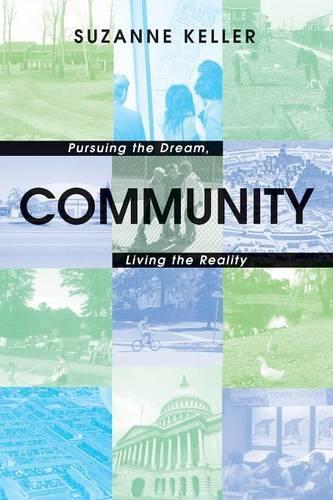
Community: Pursuing the Dream, Living the Reality
(Paperback)
Publishing Details
Community: Pursuing the Dream, Living the Reality
By (Author) Suzanne Keller
Princeton University Press
Princeton University Press
17th May 2005
United States
Classifications
Professional and Scholarly
Non Fiction
307.760974965
Physical Properties
Paperback
352
Width 152mm, Height 235mm
482g
Description
This book tells the story of how a human community comes to be and how aspirations for the good life confront the dilemmas and detours of real life. Suzanne Keller combines penetrating analysis of classic ideas about community with a remarkable and unprecedented thirty-year case study of one of the first "planned unit developments" in America and the first in New Jersey. Twin Rivers, this pioneering venture, featured townhouses and shared spaces for children's play and adult work and play in a society that stresses individual over collective goals and private over public concerns. Hence the timeless questions asked over millennia: How does an aggregate of strangers create an identity of place, shared goals, viable institutions, and a spirit of mutuality and reciprocity What obstacles stand in the way and how are these overcome And how does design generate (or deter) community spirit Inspired by the legacy of Plato, Rousseau, de Tocqueville, and Tonnies, Keller traces the difficult birth and the rich unfolding of Twin Rivers from a former potato field into a vibrant contemporary community. Most community studies remain at a highly descriptive level.This book has both broader and deeper aims, endeavoring to develop principles of the common life as we enter the age of cyberspace. Keller reveals the community of Twin Rivers through a multidimensional social microscope, having monitored the community from the day it opened by participant observation, attitude surveys, the study of collective records, and nearly 1,000 in-depth interviews with homeowners. She offers fascinating insight into how residents maintain privacy, relate to neighbors, cope with social conflict, and develop ideas about the common good. She shows that Twin Rivers residents remain hopeful about the possibility of community despite variable success in achieving their desires. Indeed, she argues that the hard-won experience, more than the utopian ideal, is the true measure of community. Keller concludes that, despite the homogenizing effects of mass communication and globalization, local communities will continue to proliferate in the foreseeable future--due to changing lifestyles and the continuing quest for roots.This important and engaging book will be appreciated by social scientists, architects, physical planners, developers and lenders, and community leaders as well as by the general reader interested in creating a bridge between individualism and community.
Reviews
Winner of the 2005 Amalfi European Prize for sociology and social sciences, Sociological Theories and Social Transformations Section of the Italian Sociological Association "Although many books have been written about community, this one is unique for combining background information with a detailed case study. [Keller demonstrates] passion for her subject and superior scholarship."--Library Journal "Suzanne Keller has given us a new classic in the study of community ... perhaps the most comprehensive account of community formation and development ever written... [A] superb addition to the study of community. Methodologically strong and theoretically sophisticated, this book makes an important contribution to urban studies and sociology more broadly."--Alexander R. Thomas, Contemporary Sociology "Community represents an extraordinary effort... The book is fascinating and insightful. It is a first-rate ethnography and history, and it also contains a rich discussion of the literature of community, ranging from Plato to modern cyberspace."--David Halle, American Journal of Sociology "The book is extremely well written. This interesting book will be of value to anyone engaged in community development today."--Social Development Issues
Author Bio
Suzanne Keller is Professor of Sociology Emeritus at Princeton University. She was the first woman in the history of Princeton to receive tenure. Her many writings include "The Urban Neighborhood" and "Beyond the Ruling Class" (both Random House), the pioneering textbook "Sociology" (McGraw-Hill), and hundreds of articles on a wide range of subjects.
